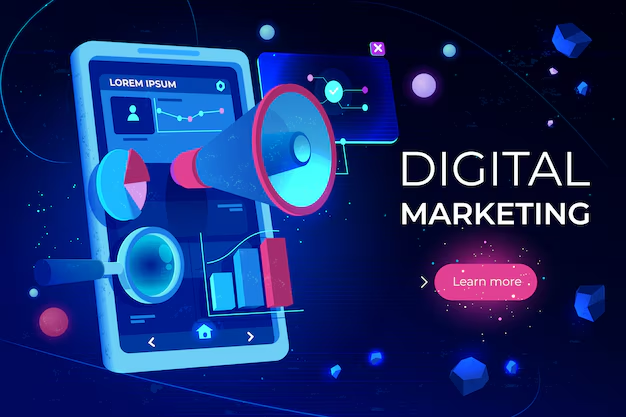Table of Contents

Digital marketing continues to evolve at lightning speed, especially as we move into 2024. The advent of advanced technologies, changing consumer expectations, and the need for brands to remain competitive in a dynamic online landscape are reshaping the field. This blog delves into the latest trends, strategies, and innovations in digital marketing while ensuring a unique, engaging read.
What Is Digital Marketing?
Digital marketing refers to the promotion of products or services using digital channels like search engines, social media, email, websites, and mobile apps. It combines traditional marketing principles with modern technology to target consumers online, where they spend most of their time.
In 2024, digital marketing has become even more integrated with data-driven strategies, relying heavily on consumer insights, artificial intelligence, and evolving digital platforms.

2. Key Components of Digital Marketing in 2024
- Search Engine Optimization (SEO): SEO remains a cornerstone of digital marketing. While its core principles—optimizing content to rank higher on search engines—remain, SEO has expanded. Google’s algorithms now prioritize user experience, favoring fast-loading, mobile-friendly websites. Google’s AI, including tools like RankBrain and MUM (Multitask Unified Model), are designed to better understand and anticipate user intent.
- Content Marketing: High-quality, informative, and engaging content is still the heart of digital marketing. However, the type of content has shifted. In 2024, users crave short-form video content (e.g., TikTok videos), interactive media like quizzes and polls, and immersive content using AR/VR. Content creation is now about offering value in highly consumable formats that keep users engaged(Digital Doughtnut).
- Pay-Per-Click (PPC) Advertising: PPC has evolved into a sophisticated form of digital advertising. Marketers are increasingly automating campaigns using AI tools that optimize ad spend, bid strategically, and focus on high-intent users. Smart bidding has made PPC more efficient, targeting specific segments of users in real time based on their likelihood to convert.
- Social Media Marketing: Social media in 2024 is not just about connecting with friends or sharing updates. Platforms like Instagram, TikTok, and YouTube have become discovery engines where users find brands, products, and services. As users increasingly use these platforms for searches, brands need to optimize social media content for searchability. Influencer marketing, especially using micro and nano-influencers, has become more powerful, allowing brands to connect with niche communities(Similarweb).
- Email Marketing: Despite the rise of new platforms, email marketing remains essential. In 2024, hyper-personalization is key. Brands are using advanced segmentation and AI to send highly targeted messages at optimal times. Personalized emails, addressing users by name and delivering relevant offers, see better engagement and conversion rates.

3. AI and Automation: The Game Changer
AI is revolutionizing digital marketing in 2024. From content creation to customer service, AI allows brands to automate repetitive tasks, make data-driven decisions, and offer personalized experiences at scale.
- AI-Powered Chatbots: These tools have become indispensable in customer service, handling queries instantly and 24/7. Chatbots can assist with lead generation, product recommendations, and resolving customer issues, providing seamless user experiences across websites and social media.
- Predictive Analytics: AI-driven analytics tools now predict consumer behaviors with high accuracy, enabling marketers to target the right audience at the right time. This predictive marketing ensures that brands focus their efforts on the highest-value leads, increasing the overall efficiency of campaigns(Digital Doughtnut).
- Content Creation with AI: AI-powered tools like Jasper or Copy.ai are now capable of generating high-quality, SEO-optimized content, improving both productivity and consistency. These tools are widely adopted for drafting blog posts, product descriptions, and even social media content.
4. Personalization at Scale
2024 is the year of mass personalization. Brands are no longer relying on generic messages for wide audiences. Instead, they create customized content and offers based on detailed customer data. By understanding user behaviors, preferences, and past interactions, brands can deliver hyper-targeted messages, whether through email, web personalization, or paid ads.
AI and machine learning enable businesses to reach their customers with the right message at the right time, enhancing the customer experience and fostering loyalty.

5. The Role of Immersive Experiences: AR & VR
Augmented Reality (AR) and Virtual Reality (VR) are finally reaching mainstream adoption, especially in retail and e-commerce. By providing immersive experiences, brands can bridge the gap between the digital and physical worlds.
- Virtual Try-Ons: AR allows consumers to try products—whether it’s clothing, makeup, or furniture—virtually before purchasing. It eliminates the friction in online shopping and makes the experience more interactive.
- Virtual Product Demos: Brands are using VR to create virtual product demonstrations. This approach is especially useful for tech companies and businesses with complex product offerings(Digital Doughtnut).

6. Voice Search and Smart Assistants
With the increasing use of smart speakers and voice-activated devices like Amazon’s Alexa and Google Home, voice search is becoming a critical aspect of digital marketing. By 2024, voice search is expected to account for a significant portion of web searches, requiring marketers to rethink their SEO strategies. Voice-friendly content, using more natural language and conversational queries, is essential to capitalize on this trend.
7. Inclusivity and Ethical Marketing
As consumers become more socially aware, they expect brands to reflect these values. Inclusive marketing, which involves showcasing diversity in race, gender, and perspectives, is not optional but essential in 2024. Brands need to go beyond token gestures and embrace real inclusivity in their campaigns.
Furthermore, ethical marketing is at the forefront of digital strategies. Data privacy, transparency, and authenticity are critical, as consumers are more concerned than ever about how their data is used. Brands that build trust by being transparent about data collection and respecting consumer privacy will stand out in 2024.
8. The Blockchain Revolution in Digital Marketing
Blockchain technology is playing an increasing role in enhancing transparency in digital advertising. Blockchain-based advertising solutions are addressing ad fraud and ensuring that marketers get what they pay for—ads that reach real people. It ensures that every click, impression, or engagement is legitimate, improving the return on ad spend.
Additionally, blockchain can provide decentralized data storage, giving users control over their data and allowing them to choose which brands can access their information(
9. The Rise of Interactive Content
In 2024, static content is no longer enough to engage users. Interactive content—such as polls, quizzes, and augmented product demos—boosts engagement and keeps visitors on your site longer. Interactive tools also help gather more data about your users, allowing brands to offer more tailored experiences.
10. The Future of Digital Marketing
Looking ahead, digital marketing in 2024 will continue to be shaped by emerging technologies like 5G, AI, and the Internet of Things (IoT). Faster internet speeds and the increasing connectivity of smart devices will further blur the lines between online and offline experiences. Additionally, the shift towards ethical AI will ensure that technologies serve consumers fairly, responsibly, and transparently.
Businesses must remain agile, adapting quickly to changing trends, embracing new technologies, and staying customer-centric in their approach.

Conclusion
Digital marketing in 2024 is an intricate blend of creativity, technology, and personalization. With AI-driven strategies, immersive experiences, and a renewed focus on ethical marketing, brands that embrace these trends are positioned to succeed. Whether it’s delivering personalized messages at scale, leveraging blockchain for secure transactions, or creating immersive AR experiences, the digital marketing landscape is more dynamic and exciting than ever.
To thrive in 2024, businesses must remain adaptable, keep up with technological advances, and maintain a consumer-first mindset. By focusing on engagement, authenticity, and innovation, marketers can ensure long-term success in an ever-changing digital world.

Add a Comment